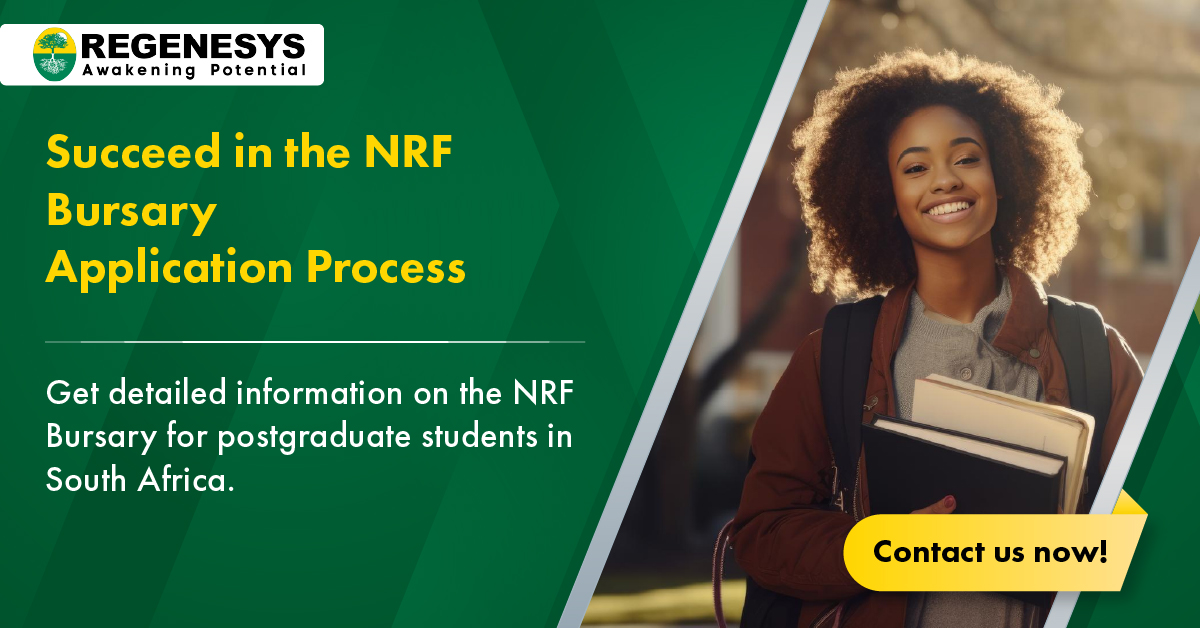Financial barriers often hamper deserving learners from pursuing their academic and career goals in the escalating South African educational sector. The NRF bursary, which was initiated over 20 years ago in 1999, supports promising candidates by offering essential financial aid. The NRF, or National Research Foundation, acts as an independent organisation that supports postgraduate education and research by bridging the gap between government policies and research institutions based on human resource development, funding and other facilities. Over time, the range has expanded to include different areas, showing South Africa’s commitment to academic excellence.
In this article, we will discuss the strategic partnership NRF has with educational institutions and how it supports educational finance aid through its bursary programmes for aspiring students in South Africa.
Table of Contents
What Is NRF Bursary?
The NRF Bursary is awarded to full-time Honours and final-year students at South African public universities. It’s more than just financial help—it’s a way to help people from less-advantaged backgrounds move up in society. By supporting education and research, the bursary helps create a lively group of researchers and innovators who make progress in science, technology, and the humanities.
Applicants for the NRF Bursary are chosen based on how well they’ve done in their studies, their plans for a research career, and whether their interests match the areas the NRF wants to focus on. This support not only helps them finish their degrees but also encourages them to contribute meaningfully to their fields of study. Overall, the NRF Bursary programme makes a big difference by nurturing talent, promoting excellence, and advancing South Africa’s research goals at home and internationally.
Fields Covered by NRF Bursary
The DSI-NRF Postgraduate Student Funding programme offers important financial support for students pursuing advanced degrees. This funding aims to promote research and academic success across various fields, helping students to achieve their goals. As a result, this bursary programme is available for Honours, Master’s, and Doctoral studies within the following fields:
- Engineering
- Technology
- Science
- Social Sciences
- Humanities
NRF Bursary Application Process
Candidates can follow the steps listed below to apply for the NRF Bursary 2025. After submitting the application, always make sure to check your email or texts for updates regarding confirmation mail.
- Step 1: Visit the NRF Connect Website.
- Step 2: Open the NRF Connect system and find the registration page.
- Step 3: Enter your full name, contact details, and email address.
- Step 4: Choose a unique username and a strong password.
- Step 5: Check your email for a verification link from NRF Connect. Click the link to confirm your email address.
- Step 6: Follow the remaining steps to finish your registration on NRF Connect.
- Step 7: Use your username and password to log in to NRF Connect.
- Step 8: Look for the honours bursary application form in the system.
- Step 9: Provide all the needed information, like your academic history, the institution you want to attend, and your personal statement.
- Step 10: Attach necessary documents such as your academic transcripts and proof of registration.
- Step 11: Double-check all the information and documents to ensure they are correct.
- Step 12: Once you are sure your application is complete, submit it through the NRF Connect system.
Documentations Required For NRF Bursary
When you submit your application, make sure to include clear copies of the following necessary documents. Submitting unreadable documents or failing to provide even one of the documents may result in the application being rejected.
- Verified copy of Identity Proof
- Certificates from all previous academic records from tertiary education up to the current date (on official letterhead from the institution).
- Confirmation of enrolment at the university for the year of application.
- Parents or guardians must provide proof of household income, whether through their latest payslips if they have a job, an affidavit if they are not employed, or a SASSA grant letter if relevant.
NRF Bursary Eligibility Requirements
Before beginning the NRF Bursary application process, make sure that you are eligible for the allowance and meet the requirements completely. Failure to meet the criteria may lead to disqualification or rejection of the application. Listed below are the NRF Bursary requirements that aspirants must adhere to:
NRF Bursary Eligibility Criteria
Candidates must meet the following requirements before their application can be submitted:
- You should either already be registered or getting ready to enrol in a postgraduate course (Honours, Master’s, or Doctoral) in the areas of Science, Engineering, Social Sciences or Humanities.
- The age limitations for applying for this bursary are as follows: Individuals who are 29 or below are qualified for Honours funding. Candidates who are 30 years or younger can receive financial support for a Master’s degree programme. To receive financial assistance for their Doctoral studies, candidates must be no older than 32.
- You must have achieved at least 65% in the previous academic certificate.
- You must show either a financial need (with a household income below R350,000 per year), have a disability, or perform well academically.
- Candidates must be citizens of South Africa or hold permanent residency to receive financial support for FCS.
- For PCS funds disbursement, you can be a South African citizen or have a permanent residency. International candidates who do not meet all the NRF bursary requirements are eligible for PCS funds.
NRF Bursary 2025: Allowance Provided
The NRF Bursary 2025 accommodates students intending to pursue postgraduate studies but lacking the financial means to do so. Students can apply for DSI-NRF Postgraduate Student Funding for the academic year 2025 by checking the eligibility criteria and application process. This bursary covers Honours, Master’s, and Doctoral studies in fields like Science, Engineering, Technology, Social Sciences, and Humanities. Students can be awarded either Partial Cost of Study (PCS) or Full Cost of Study (FCS), depending on their specific requirements.
FCS, or Full Cost of Study, is intended for learners who are economically challenged (family income amounts to less than R350,000 per year), students with disabilities or those with excellent academic achievements. However, due to financial constraints, some students who qualify for full course subsidy (FCS) may receive only partial course subsidy (PCS). The NRF Bursary allowance covers expenses such as tuition, accommodation, living expenses, travel, food, and academic materials. This financial support aids students to focus mainly on their academic advancement without the stress of financial burdens. The NRF makes sure students have the resources essential to successfully complete their studies and make progress in their chosen field.
You can check out more post-graduate bursaries here.
NRF Bursary 2025: Closing Date
Keeping track of deadlines when applying for the NRF Bursary in 2024 is crucial. Knowing the closing date will help you submit your application on time and increase your chances of getting funding. Here are the closing dates for different levels of study:
|
Degree Level |
Closing Date |
|
Honours (General) |
22 November 2024 |
|
First-time Master’s |
5 July 2024 |
|
First-time Doctoral |
5 July 2024 |
|
Master’s and Doctoral Extension Support |
15 September 2024 |
Note: It is important to remember that closing dates may vary depending on the institution you are applying to. Therefore, verifying the specific deadlines with your university or college is advisable. Applications submitted after the stated closing dates will not be accepted, so submit your application well before these dates to ensure it is considered for funding.
NRF Bursary: Contact Details
The NRF Bursary offers important support to South African students at various academic levels—undergraduate, postgraduate, and doctoral. Below are the contact details you may need to apply for NRF funding easily.
- Telephone: 012 481 4000
- Postal: PO Box 2600, Pretoria, 0001
- Address: NRF Building, South Gate CSIR Complex, Meiring Naudé Road, Brummeria, Pretoria
Conclusion
In summary, the NRF Bursary 2025 programme offers hope to aspirants who wish to advance their academic careers but are held back by the financial barriers they face. They can pursue education in various fields like Science, Engineering, Technology, Social Sciences, and Humanities. With the sole dedication of encouraging academic excellence, the NRF offers financial assistance through its DSI-NRF Postgraduate Student Funding programme, including Partial Cost of Study (PCS) and Full Cost of Study (FCS) provided as per the specific needs of each student. The NRF eases financial burdens for students, allowing them to focus on their studies and contribute meaningfully to South Africa’s dedication to cultivating a knowledgeable and skilled next generation.
About to take your first step towards bursary application? Regenesys is here to provide you with the programme quotation to assist you in beginning your journey for the bursary. Besides, our career counsellor will offer you guidance to help you navigate the bursary application process. Connect With Us Now!
NRF Bursary 2025 – FAQs
Who can I contact for more information regarding the NRF Bursary 2025?
If you have any questions related to the NRF Bursary Programme, please contact your University’s Research or Postgraduate office. If you need to contact the NRF directly, please reach out to the relevant person mentioned on the official NRF website.
How to apply for NRF Bursary?
To apply for the NRF Bursary 2024, first check if you meet the eligibility criteria and follow the instructions provided. Then, look into the different funding options available, gather all necessary documents and submit your application through the NRF Online Submission System.
How competitive is the NRF Bursary?
Competition for the NRF Bursary is fierce. Selection is determined by academic achievement, financial need, and other qualifications. Numerous applications are received every year, and financial aid is awarded to individuals who show outstanding academic performance and legitimate financial need.
What is the age limit for applying for the NRF Bursary?
To be eligible for the NRF Bursary, Honours applicants must not exceed the age of 29, and Master’s degree applicants must be 30 or under. In order to receive funding for their Doctoral studies, candidates must be under the age of 32.
Can I apply for the NRF Bursary if I am already receiving funding from another source?
Yes, applicants can still apply for the NRF Bursary if they are receiving funding from another source. However, it is important to disclose this information in your application.







